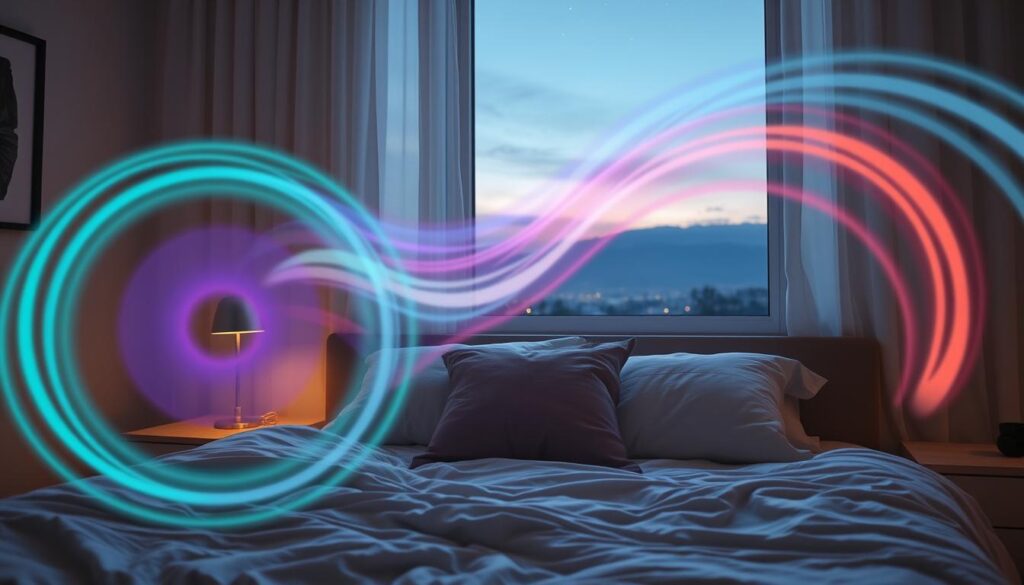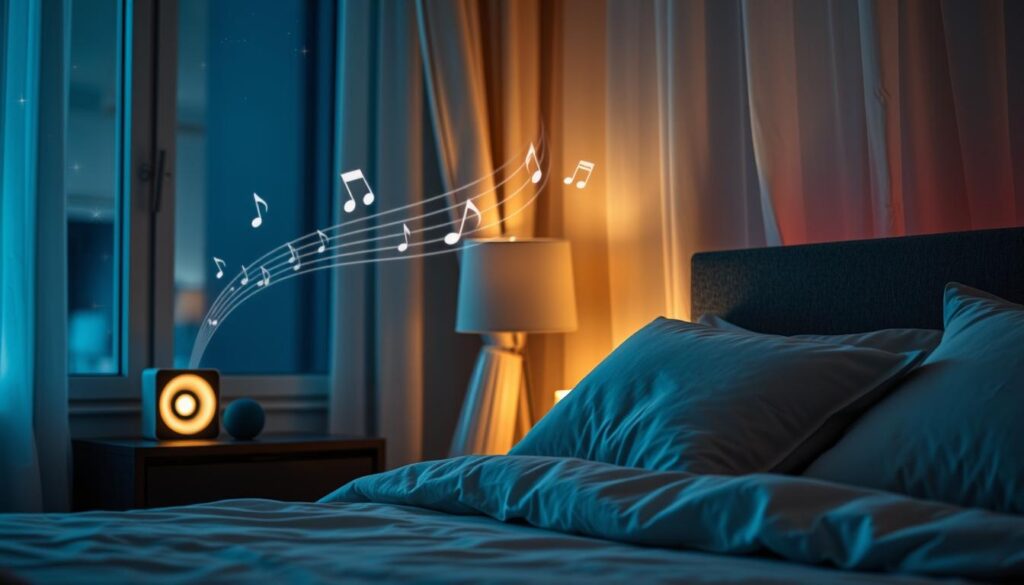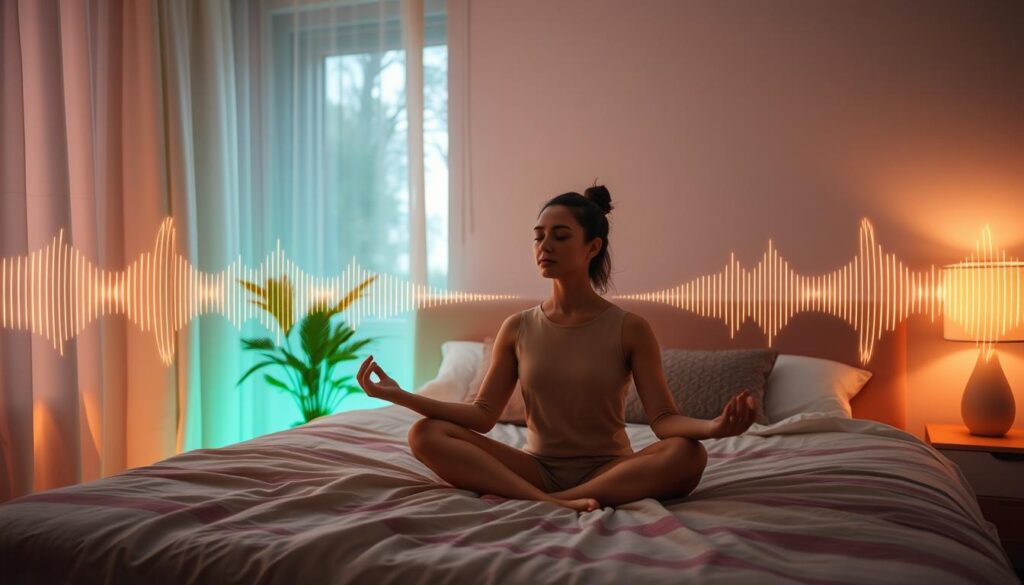Binaural Beats and Sleep: Your Guide to Better Rest.
Did you know 10 to 30% of adults have trouble sleeping? This shows many people struggle to get good sleep. Binaural beats might help. They are sounds that make your brain feel calm, which can help you sleep better.
Studies show binaural beats can help you relax and sleep well. They work by changing your brain’s waves. This can make you feel less anxious and more relaxed.
Exploring binaural beats shows they can do more than just sound good. They might help you sleep better. Since half of adults want better sleep, learning about binaural beats could be very helpful.
Understanding Binaural Beats
Binaural beats are a cool sound trick. They happen when you hear two different sounds in each ear. Your brain then makes a third sound, called a binaural beat. This sound is key to brainwave syncing.
Many people ask how binaural beats help with sleep. They also wonder about their effects on our minds.
Studies say binaural beats can make sleep better. Listening to sounds around 3 Hz helps the brain sleep deeper. This is good for feeling well-rested.
Research also shows binaural beats can help with sleep quality. They can make it easier to fall and stay asleep. This is great for people who are always active, like athletes.
Binaural beats can also lower anxiety. This helps you sleep better. They can even improve memory, mood, and thinking skills, especially with sounds around 40 Hz.
Alpha sounds (8 Hz to 14 Hz) help with relaxation and stress. Binaural beats can match brain waves, which is good for therapy. They offer a way to change your mind’s state with sound.
More research is needed to fully understand binaural beats. But, they show promise for better sleep and mental health. This is exciting for those looking to improve their well-being.
How Binaural Beats Work

Binaural beats are a cool sound trick that changes how our brains work. When we listen to two different sounds in each ear, our brain makes a third sound. This third sound can change our brainwaves, helping us relax and sleep better.
Brainwave Synchronization
Our brain tries to mix the two sounds it hears. Different sounds make our brainwaves change. For example, delta waves help us sleep without dreams.
Theta waves make us relax and dream more. Alpha waves help us calm down. Beta waves make us focus and stay awake. Gamma waves keep us alert when we’re awake.
- Delta: 0.5–4 Hz – Associated with deep sleep.
- Theta: 4–7 Hz – Linked to meditation and creativity.
- Alpha: 8–12 Hz – Promotes relaxation.
- Beta: 13–30 Hz – Enhances focus and activity.
- Gamma: 30–50 Hz – Supports learning and concentration.
Auditory Illusions Explained
Binaural beats are a cool trick for our ears. They make us feel like we’re hearing a third sound. This trick helps us relax and sleep better.
Many studies show binaural beats can help us relax and focus better. They can even make us happier. This research shows binaural beats are good for our minds and sleep.
| Brainwave Type | Frequency Range (Hz) | Associated Effects |
|---|---|---|
| Delta | 0.5–4 | Deep sleep and dreamless states |
| Theta | 4–7 | Enhanced meditation and creativity |
| Alpha | 8–12 | Promotes relaxation |
| Beta | 13–30 | Increases alertness and concentration |
| Gamma | 30–50 | Supports cognitive function and learning |
Binaural Beats and Sleep: Benefits and Effects

Binaural beats can make sleep better and help you relax. They are great for deep sleep and easing anxiety. By listening to certain sounds, you can feel more relaxed and sleep better.
Improving Sleep Quality
Research shows binaural beats help you sleep deeper. They make your sleep more restful. This is because they match your brain’s waves, helping you sleep better.
Adding binaural beats to your bedtime routine can help. You might sleep longer and wake up feeling refreshed.
Reducing Anxiety and Stress
Anxiety can hurt your sleep. But, binaural beats can help. A 2017 study found they lowered anxiety.
These sounds create a calm space for your mind and body. A bedtime routine with binaural beats can reduce stress. This leads to better health.
Enhancing Relaxation for Better Sleep
Meditation with binaural beats relaxes you and gets you ready for sleep. A 2019 study said listening for 10 minutes is best. This helps you relax and sleep deeper.
Creating a calm space with binaural beats is key. It helps you relax and sleep better.
| Benefit | Description |
|---|---|
| Improved Sleep Quality | Enhances duration and depth of sleep, facilitating restorative processes. |
| Reduced Anxiety | Effectively lowers anxiety levels through low-frequency sound experiences. |
| Enhanced Relaxation | Calming audio aids relaxation, promoting better sleep outcomes. |
Using Binaural Beats for Deep Sleep

To get the most out of binaural beats for sleep, pick the right frequencies. Also, make sure you listen in a quiet place. Binaural beats for deep sleep can help those with insomnia sleep better.
Recommended Frequencies for Sleep
The delta frequency range, from 1-4 Hz, is great for deep sleep. Research shows that a 3-Hz binaural beat can make sleep last longer. Here are some frequencies that help with sleep:
| Frequency Range | Effect on Sleep |
|---|---|
| 1-4 Hz | Promotes deep sleep (N3 stage), vital for recovery |
| 4-8 Hz | Facilitates REM sleep, associated with vivid dreaming |
| Theta (4-8 Hz) | Reduces stress and aids relaxation |
| Alpha (8-12 Hz) | Encourages relaxation and drowsiness |
Creating an Ideal Listening Environment
A calm setting makes binaural beats for insomnia work better. Consider these tips:
- Find a quiet, comfy spot away from distractions.
- Wear good headphones to get the sound right in each ear.
- Add binaural beats to your bedtime routine for better sleep.
- Keep the volume low to avoid hurting your ears.
By picking the right frequencies and listening in a quiet spot, you can sleep deeper and feel refreshed.
Binaural Beats for Insomnia

Many people with insomnia find binaural beats helpful. These sounds help relax and reduce anxiety, making it easier to sleep. There are 37 songs now, all made to help with sleep.
Binaural beats for insomnia are easy to find in many places. Studies show they work by using sounds in the delta and theta ranges. This is important because studies say 53% of people in South Korea have insomnia symptoms.
Listening to these beats can help you relax and sleep better. They help with emotions, stress, and even brainwaves. This can make you feel better emotionally.
Doctors are starting to see the value of binaural beats for sleep. They might not replace all treatments, but they can help. It’s good to talk to a doctor about sleep issues, but binaural beats can be a useful tool.
| Frequency Range | Binaural Beats Type | Associated Benefits |
|---|---|---|
| Below 4 Hz | Delta | Induces deep sleep and restorative stages |
| 4-8 Hz | Theta | Facilitates relaxation and emotional processing |
| 8-13 Hz | Alpha | Reduces anxiety and enhances relaxation |
How to Incorporate Binaural Beats into Sleep Meditation

Adding binaural beats meditation to your bedtime routine can make you relax better and sleep deeper. This method uses special sounds to create a calm space for sleep. Mixing guided meditation with binaural beats helps you focus better and relax deeper.
Guided Meditation Combined with Binaural Beats
Guided meditation is a great match for binaural beats. Choose tracks that have calming words and the right sound frequencies for sleep. A 3 Hz binaural beat can lead to deep sleep by creating delta waves. This mix makes it easier to relax and sleep better.
Establishing a Sleep Routine
Having a regular sleep routine with binaural beats can help your body get into a natural sleep cycle. Using these sounds can make your sleep longer and better. Here are some steps:
- Set a fixed bedtime and wake-up time.
- Make your sleep area quiet and calm.
- Use binaural beats meditation 30 minutes before bed.
This creates a calming bedtime ritual. Binaural beats in the delta wave range help you relax. Over time, you might sleep better and have fewer night-time wake-ups.
| Brainwave Type | Frequency (Hz) | Associated State |
|---|---|---|
| Delta Waves | 0.5 – 4 | Deep Sleep |
| Theta Waves | 4 – 8 | Deep Relaxation and Meditation |
| Alpha Waves | 8 – 15 | Relaxation and Creativity |
| Beta Waves | 15 – 30 | Active Thinking |
| Gamma Waves | 30 – 50 | High-level Cognitive Function |
Try different meditation tracks and styles to find what works best for you. This helps you create a sleep and relaxation plan that fits your needs.
Potential Side Effects of Binaural Beats
Binaural beats therapy has many benefits. But, some people might feel minor side effects. Knowing about these can help you choose better.
Irritability and Frustration
Some users might feel annoyed or upset while listening. This could be because of sound frequencies that don’t feel right. Picking tracks with calming sounds can make things better.
Listening Volume Considerations
How loud you listen to binaural beats is very important. High volumes can hurt your hearing. Try to keep the sound between 60 and 80 dB. Start with a lower volume and adjust as you get used to it.
| Key Considerations | Recommendations |
|---|---|
| Potential Irritability | Select soothing soundtracks with binaural beats |
| Volume Levels | Aim for levels below 60 dB for comfort |
| Listening Duration | Start with shorter sessions, gradually increasing |
| Attention to Frequency | Choose frequencies below 1,000 Hz for optimal effects |
By paying attention to these points, you can enjoy more of the good stuff. Knowing what you like and adjusting your listening can make it even better.
Research on Binaural Beats and Sleep Quality
Studies on binaural beats for sleep show great promise. A study with ten healthy people found that binaural beats helped them fall asleep faster. This means binaural beats can make sleep deeper and more restful.
Heart rate tests showed that binaural beats made heart rates lower before and during sleep. This could help people relax and sleep better. Since 10% to 30% of adults struggle with sleep, this is very helpful.
More studies back up these findings. They show that sound can really help improve sleep. A 2022 study found that 70% of people slept well after using delta binaural beats. More research is needed to fully understand how binaural beats work for sleep.
